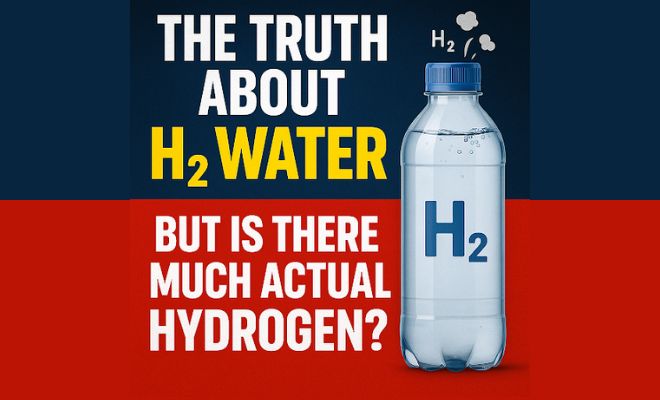“Hydrogen water benefits” is one of the most searched phrases in the wellness world right now. From antioxidant promises to performance enhancement, hydrogen water is marketed as a near-magical elixir.
But let’s take a step back.
Does science back up the hype? And if it does, is there a more effective way to get those benefits?
This blog breaks down the facts and introduces you to an alternative backed by science and used in medical settings: hydrogen inhalation.
What are the Claimed Hydrogen Water Benefits?
1. Antioxidant & Anti-Inflammatory Effects
Hydrogen water is believed to fight oxidative stress by acting as a selective antioxidant.
A 2020 study in Scientific Reports showed that people who drank hydrogen-rich water for four weeks had significantly increased antioxidant enzyme activity and lowered inflammatory markers.
This suggests possible benefits in slowing down aging and preventing diseases linked to chronic inflammation, like diabetes and Alzheimer’s.
2. Metabolic Health Support
In another trial published by DovePress, hydrogen water improved several metabolic syndrome markers:
- Lower fasting glucose
- Better LDL cholesterol levels
- Reduced inflammation
These results suggest hydrogen water may support heart and metabolic health—key concerns for many adults today.
3. Muscle Recovery & Physical Performance
Fitness enthusiasts also embrace hydrogen water.
A 2024 study in Frontiers in Physiology reported that athletes who drank hydrogen-rich water post-exercise experienced:
- Less muscle fatigue
- Faster recovery
- Improved performance perception
Hydrogen water has since been adopted by runners, lifters, and biohackers.
Related Article: Hydrogen Water for Skin
But Here’s the Catch: Hydrogen Water Has Limitations
Despite these exciting claims, hydrogen water faces several scientific and technical challenges that limit its true potential.
1. Limited Hydrogen Content
Even in perfect storage conditions, water can only dissolve up to 1.6 mg of hydrogen per liter.That’s a minuscule dose, especially compared to the higher concentrations used in clinical research.
To get 144g of hydrogen (the typical dose used in therapeutic inhalation), you’d have to drink more than 144 tons of water.
2. Hydrogen Evaporates Quickly
Hydrogen is the smallest, lightest molecule in the universe—it leaks out rapidly.
Within 10–20 minutes of opening a bottle, much of the hydrogen content may be gone.This makes consistent dosage difficult unless you drink it immediately after production.
3. Slow Absorption
Hydrogen in water must pass through the digestive system, which slows absorption and reduces bioavailability. In contrast, gases absorbed through the lungs reach the bloodstream within seconds.
Related Article: Hydrogen Water Side Effects
Hydrogen Inhalation: A More Potent Alternative?
If you’re genuinely looking for measurable health effects, hydrogen inhalation therapy may be the smarter option.
What the Experts Say
According to Dr. Youn Sung Lee, a leading researcher in molecular hydrogen:
“One liter of hydrogen water has about 1.6 mg of hydrogen. But our hydrogen inhalation device delivers 1200 mL per minute.That’s roughly 144g in 2 hours—equivalent to drinking over 144 tons of water.”
This comparison illustrates the massive difference in dose and absorption efficiency.
Clinical Evidence Is Growing
Hydrogen inhalation isn’t just theoretical—it’s being studied in real-world medical contexts:
- Parkinson’s Disease
- Inhalation reduced neuroinflammation and improved motor symptoms.
- Stroke Recovery
- Studies show better neurological outcomes when hydrogen is inhaled post-stroke.
- Cognitive Decline After Surgery
- Research shows decreased oxidative stress and improved cognitive recovery after anesthesia.
- Cancer Supportive Care
- Early research suggests that hydrogen therapy for cancer may reduce the side effects of chemotherapy and improve the quality of life for patients undergoing treatment.
In these settings, hydrogen is used not as a supplement—but as a therapeutic agent.
How Does Hydrogen Inhalation Work?
Inhaled hydrogen gas passes through your lungs and quickly enters the bloodstream.
This direct delivery system bypasses the digestive tract, allowing molecular hydrogen to reach your cells and organs within minutes.
From there, it targets oxidative stress, supports mitochondrial function, and regulates inflammatory responses.
Unlike hydrogen water, which offers inconsistent absorption and rapidly diminishing hydrogen levels, inhalation ensures steady and high-concentration exposure—critical for clinical effects.
Which One Should You Choose?
Hydrogen water is a great introduction to hydrogen therapy. It’s easy to consume, safe, and available at many health stores.
But if you’re:
- Struggling with chronic fatigue
- Concerned about aging
- Experiencing brain fog
- Looking for serious recovery support
…then hydrogen inhalation offers significantly higher potency, faster results, and clinical-grade reliability.
Experience Hydrogen Inhalation at Home with Huelight
At Huelight, we provide advanced hydrogen inhalation devices designed to bring hospital-grade technology into your home.
Our systems are:
- Quiet and compact
- Easy to use daily
- Built for anti-aging, cognitive enhancement, and overall recovery
- Equipped with nanobubble delivery technology for improved absorption
- Backed by clinical partnerships and safety testing
Whether you’re optimizing your wellness or managing chronic conditions, our hydrogen devices give you a powerful, non-invasive tool to support your health.
Ready to Breathe Real Hydrogen Benefits? It’s time to go beyond the hype. And experience the real benefits of hydrogen therapy.
Consult with Huelight Experts today!
FAQ: Hydrogen Water vs Hydrogen Inhalation
Is hydrogen inhalation safe for daily use?
Absolutely. Numerous clinical studies confirm its safety, and Huelight devices are designed for routine home use.
How long does a hydrogen inhalation session last?
Most users start with 30–60 minutes daily, depending on personal needs. Our devices allow customization and are quiet enough to use while working or resting.














